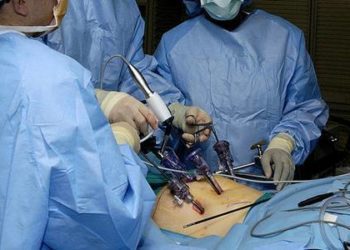#VisualAbstract: Obeticholic acid for the treatment of non-alcoholic steatohepatitis
1. Obeticholic acid, a farnesoid X receptor agonist, prompts fibrosis improvement in patients with non-alcoholic steatohepatitis (NASH)
Evidence Rating Level: 1 (Excellent)
Non-alcoholic steatohepatitis (NASH) is an increasingly common cause of chronic liver disease and cirrhosis. Currently, there are no approved treatments for NASH. The farnesoid X receptor, a nuclear receptor, regulates bile acids and metabolism, and recent data indicates that its activation can reduce hepatic fibrosis and inflammation. Obeticholic acid is a potent farnesoid X receptor agonist that is approved for the treatment of primary biliary cholangitis, but has not yet been studied in the treatment of NASH. In this randomized controlled trial, 1,968 patients with NASH (stage F1-F3 fibrosis) were assigned to receive obeticholic acid 25 mg daily, obeticholic acid 10 mg daily, or placebo to assess fibrosis improvement (≥1 stage) with no worsening of NASH, and NASH resolution with no worsening of fibrosis, at 18 months. The intention-to-treat population included 931 patients with stage F2-F3 fibrosis. Researchers found that more patients in the obeticholic acid groups achieved fibrosis improvement when compared to patients in the placebo group (25 mg: 23%, p=0.0002 vs. placebo; 10 mg: 18%, p=0.045 vs. placebo; placebo: 12%). Although more patients in the obeticholic acid group achieved NASH resolution than in the placebo group, this did not meet statistical significance (25 mg: 12%, p=0.13; 10 mg: 11%, p=0.18). Decreases in key liver enzymes were also observed in patients treated with obeticholic acid (decrease in ALT: 33% for obeticholic acid 25 mg, 26% for obeticholic acid 10 mg, 6% for placebo; decrease in AST: 24%, 19%, and 4%, respectively). The rate of adverse events was similar across groups as was the rate of serious adverse events. Pruritus was the most common adverse event, and occurred more frequently in the obeticholic acid groups (25 mg: 51%; 10 mg: 28%; placebo: 19%), which led to more frequent treatment discontinuation in the 25 mg obeticholic acid group). This study was limited by the lack of clinical outcomes data at the time of analysis. In summary, this study indicates that obeticholic acid 25 mg daily may improve liver fibrosis and NASH disease activity, though may cause intolerable pruritus in some patients. Further studies are necessary in assessing clinical outcomes.
Click to read the study in Lancet
©2019 2 Minute Medicine, Inc. All rights reserved. No works may be reproduced without expressed written consent from 2 Minute Medicine, Inc. Inquire about licensing here. No article should be construed as medical advice and is not intended as such by the authors or by 2 Minute Medicine, Inc.






